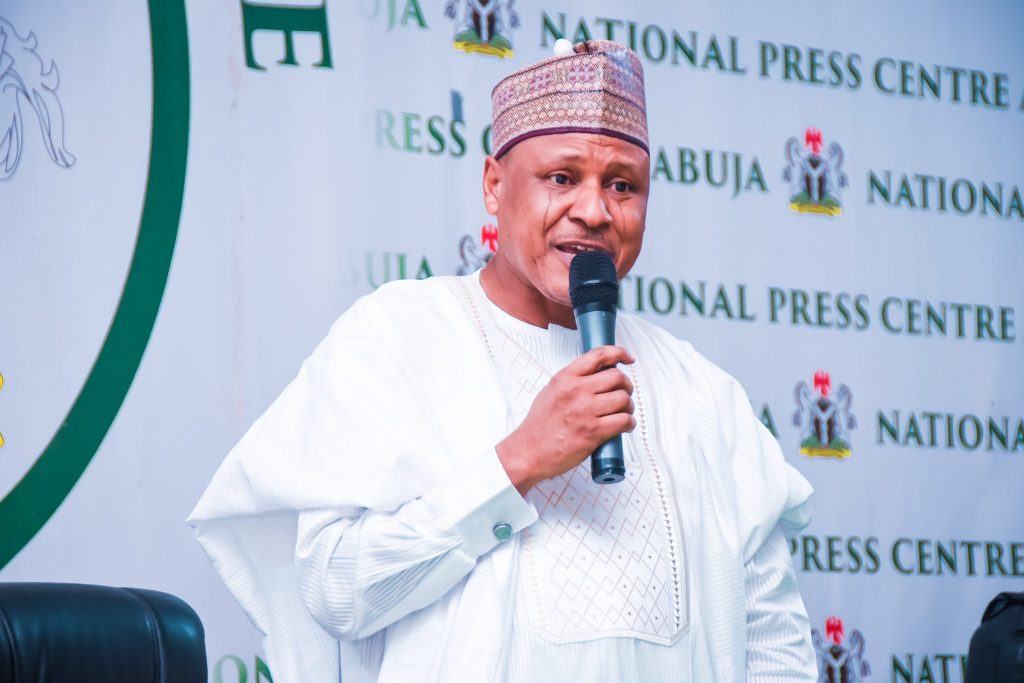Minister: FG reforms yielding positive results, government will go after saboteurs

![]()

Nigeria’s Minister of Information and National Orientation, Mohammed Idris, says the government’s economic reforms, which have faced criticism from some quarters, are yielding positive results for the country.
Idris said in a statement on Friday that the reforms, initiated by President Bola Ahmed Tinubu, who took office in May 2023, had improved the country’s fiscal and monetary situation, boosted oil production, increased capital inflows and created more resources for public spending.
Said Minister Idris “when President Bola Ahmed Tinubu was sworn in on May 29, 2023, he made far-reaching statements regarding his economic vision for Nigeria. Two policy statements stood out in this regard.
First, he announced an immediate end to the petrol subsidy regime, because it could no longer justify its ever-increasing costs in the wake of dwindling resources. He also made a firm promise to channel the savings accruing from the removal into much-needed investments in public infrastructure, education, healthcare, social investment and prosperity for tens of millions of Nigerians.
Since the removal of the petrol subsidy, petrol importation has dropped by fifty percent, amounting to one billion liters monthly, according to data released by the National Bureau of Statistics. On a related note, crude oil production is rising steadily, increasing to an average of 1.55 million barrels per day in Q4 2023, from 1.22 million barrels per day in the preceding quarter.
Also, monthly receipts by States from the Federal Accounts Allocation Committee (FAAC) have surged since the subsidy removal, giving governments at all levels billions of Naira in extra headroom to deliver the dividends of democracy to Nigerians.
It is instructive that the removal of the petrol subsidy was one policy decision that all the three major candidates were unanimous on, in their campaign messaging. It is therefore mystifying to see people who had argued stridently for the removal, now pretending to be against it today. This insincerity does not bode well for our country and our democracy.
President Tinubu’s second most far-reaching pronouncement was his promise that the Central Bank of Nigeria (CBN) would work towards a unified exchange rate. In line with his vision for a more transparent and equitable monetary policy, yet without jettisoning its operational independence, the CBN took the very bold step of loosening control of foreign exchange rates, allowing access to foreign exchange to take place at market rates determined on the principle of ‘willing seller willing buyer.’
As a government, we are not under any illusion that these policy moves are silver bullets, or that nothing else is required. We understand that these are foundational fiscal and monetary policy moves, upon which we must now build the superstructure of true economic growth and prosperity.
As respected economists and experts have acknowledged, these foundational reforms will be difficult and painful for Nigerians in the short-term. At the same time, there is the consensus that they are inevitable, given just how much they have held back robust and lasting economic growth.
The problems that we are solving are no doubt multifaceted, intertwined, and deep-rooted, requiring creative, strategic, decisive, and multi-pronged solutions. These bold moves being implemented are in full alignment with what is required.
The CBN has been proactive, initiating a comprehensive strategy to enhance liquidity in the forex market. In addition to unifying the rates, the bank has also cleared a significant amount of outstanding Forex obligations, and outlined new operational mechanisms for commercial banks, Bureau De Change (BDC) operators and International Money Transfer Operators (IMTOs).
It is heartwarming to note that we are starting to see the results. Indeed, the naira is stabilizing, and the foreign exchange market is seeing a surge of inflows. The latest NBS figures show that capital importation into Nigeria rose by over 66 percent in Q4 2023, compared with the preceding quarter. The CBN Governor has also highlighted the fact that $1.8 billion flowed into the forex market last week, on the back of the new reforms.
Sadly, as with any effort to reform and sanitise a system entrenched in long-term malpractice, the CBN’s efforts have been met with ferocious resistance from speculators and other unscrupulous players within and outside our country, who profit from dysfunction and opacity.
To tackle this, regulatory and enforcement agencies of government have been working round the clock in the past few days, joining forces to address these efforts at undermining the reforms. That strategic alliance has led to the intelligence-led identification, investigation and sanctioning of individuals and organizations involved in illegal activities and sabotage within the forex market.
Relevant regulatory and security agencies have been directed to remain vigilant to ensure that malpractices capable of undermining our currency are averted and that those engaged in these acts are brought to book. The government will not allow its efforts to be jeopardised.
The emerging stability of the naira is in the interest of all Nigerians.
Nigerians should rest assured that the government will continue to take further steps to stabilize the naira and safeguard our economy.
We will continue to seek the patience and understanding of Nigerians as we push through these difficult times, into a season of abundant benefits and truly renewed Hope. As the President never fails to emphasize, these headwinds we are facing are only temporary, and, collectively, we will surely overcome.
The President and his team are and will remain resolutely committed and focused on the task of bringing immediate relief and enduring prosperity to all Nigerians.”




